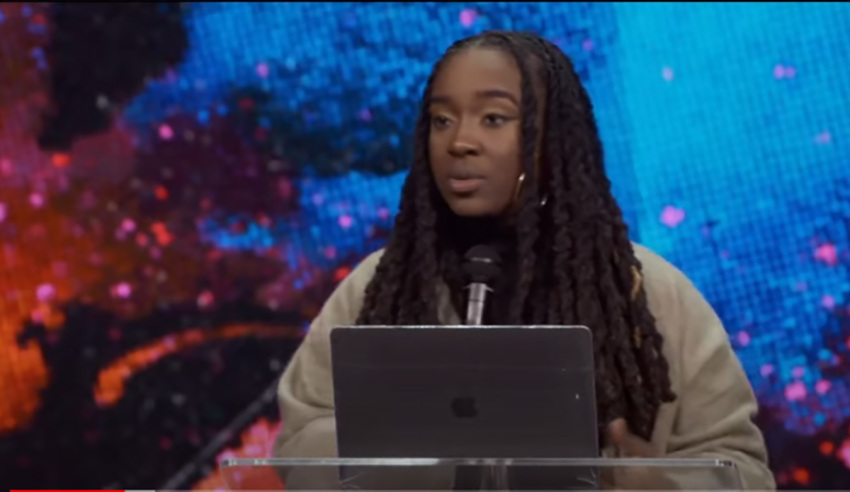Jackie Hill Perry: Christians who blame God for sin elevate Satan

Jackie Hill Perry, who made the decision years ago to leave a lesbian lifestyle to follow Christ, warned young Christians against blaming God for their sins.
The 32-year-old poet, speaker and hip-hop artist who hails from St. Louis, Missouri, told the Gen Zers gathered at Passion 2022 that when Christians cannot accurately define God, without defining the word “holiness” because “God is holy.” And when Christians blame God for the sin in the world, they deny the holy nature of God by “projecting human nature onto Him.”
The things humans believe about God determine how they behave, Perry said, and at the root of all sin is unbelief in the Word and in God's worth.
“What’s problematic about our sinful nature?" she asked those gathered Monday at the two-day annual conference spearheaded by Passion City Church in Atlanta, Georgia. "We talk about God like He’s unjust, just because He allows some suffering in our world. We open up His Word and we refuse to believe it’s true, as if God had the potential to lie to you. But who I described sounds more like the devil than it does God,” she added.
“Who do you suppose we are imagining God as when holiness is disregarded in our definitions of Him? We have somehow supposed that Satan sits on the throne."
“You don’t have sex with people you aren’t married to just because you’re lustful, you do it because you don’t believe that God is Lord of the body,” she declared. “You didn’t take a job that God told you not to just because you’re disobedient. You did it because you didn’t believe that God can provide for you at a lower wage.”
It is very difficult for Christians to be holy sometimes, Perry said, because they tend to try to modify behavior externally without dealing with the belief systems at the root of their sinful issues.
“I have a suspicion. I think that one reason why faith and, therefore, holiness is so difficult for us is because we live in a constant state of self-preservation. We’ve experienced all kinds of pain, betrayal, abuse, unfaithfulness, inconsistency, dishonesty. We know this world isn't safe because sinners live here, so we are always trying to protect ourselves from the potential of any kind of hurt, any kind of pain, any kind of suffering,” she explained.
“And I wonder if, underneath our doubt, the reason why we don’t trust God, and therefore we struggle with holiness, is because we have a suspicion that God isn’t safe either; that He is just like the father that left us, that He is like the mother that didn’t nurture us, the friend that didn’t listen to us, or the person in a position of power that abused us,” Perry posited.
“So when God uses His Word and His son to reveal Himself as a heavenly parent or a faithful friend or our Lord, we don’t relinquish control, surrender our wills because we have mistakenly projected onto God the nature of everybody that has sinned against us,” she said.
Perry further explained that “if God is holy, He cannot sin,” which, in turn, means He cannot sin against them.
“If God cannot sin against you, doesn’t that make Him the most trustworthy being that exists? The holy God is a God that is without fault.”
Earlier in her talk, Perry reminded those gathered that, as Christians, they have the ability to know the real definition of “holy” as they begin to get a better understanding of God's character and make that their foundational truth and sole definition of the Lord.
“How we define the term [holy] cannot and should not start with the people you know or the feelings you have,” Perry advised. “Holiness finds its most precise definition in who God has revealed Himself to be.”
“There’s a lot of baggage around the word holy,” Perry continued. “Some of us hear the word and immediately think about people who are always dressed in a particular kind of apparel. They are serious. They are strict. They are rigid. And they seem to be resistant to fun.”
Oftentimes, Perry said, Christians have false definitions of the word holy, and it makes them uncomfortable.
“Some of us hear the word holy and we immediately feel something,” she said. “We might feel fear. We feel shame. We might feel even defensive or on guard or we might feel curious.”
“Seems like we are in a world where definitions are always changing. Consider words like man, woman, marriage, salvation, truth, love, privilege, oppression, and how each word might mean different things to different people,” Perry pointed out.
“But when we get to God, we don’t have the authority to redefine or re-imagine Him. We don’t have the right to redefine or reimagine holiness either. Because God is holy,” she emphasized.
Reading from Isaiah 6:1-8, Perry also shared how the prophet Isaiah saw the Lord on His throne and He heard the heavenly creatures called seraphim praising God and singing about the doctrinal nature of God to one another. The seraphim were praising God by saying to one another: “‘Holy, holy, holy is the Lord of hosts.’’”
“If the seraphim were suddenly replaced by people, in our current cultural context, then the lyrics of their song might be different,” Perry said. “If we asked someone and gave them the supernatural ability to leave Earth and enter Heaven and stand near the throne and ask them to sing and attribute [it to] God, they would stand there, open up their mouths and out of it would come: ‘Love, love, love, is the Lord of hosts.”
God is love, Perry said before suggesting that Christians should ask themselves: “Would God be love if God wasn’t holy?”
“Without righteousness permeating His being, setting Him apart from all that is arrogant, all that is abusive, all that is self-serving, self-protected and self-centered, if there was no righteousness, if there was no moral purity in God, would He be able to love you at all?” Perry asked.
“It is because God is holy that He is also kind, humble, honest, faithful, aka, loving,” she declared.
When the seraphim had a chance to say something about the nature of God, they said, He is “holy,” Perry noted, stressing the repetition of the seraphim’s praises. They mention God’s holiness more than two times, Perry said, and in Hebrew, literature repetition is a way of putting emphasis on words and phrases.
In the same way, when Jesus wanted to emphasize the truthfulness of His statements, He would say: “‘truly, truly,’” she added.
“Repetition adds emphasis. So to say that God is ‘holy, holy, holy implies that the seraphim recognized that God is not merely holy, but God is most holy, supremely holy, completely holy, utterly holy,” she said.
Perry recalled that throughout her early experiences in church, holiness meant different things to her based on how other people acted toward her.
“It was God is holy. I’m not, so I’m going to Hell,” Perry recounted of her early church days. “It also seemed like holy people talked about Hell all the time. You could laugh at the wrong joke and they’ll be like: ‘You’re going to laugh your way straight to Hell.’”
“And I was confused about why I have to be efficient, even on my way to damnation. … It just seemed like holy people always liked to talk about judgment, always liked to talk about sin, always liked to talk about wrath,” she continued.
As a result of her early church experiences, Perry said she once believed that holiness was only about “rule-keeping and judgment.”
“I think most of us at one point may have had a narrow, most likely negative framework of the term holy, and I want you to know if that is the case, then it has affected how you view and thus interact with God,” Perry added. “Because if by holy we only mean restriction, and not also the possibility of freedom or simply wrath and not mercy, then when you hear God is ‘holy, holy, holy,’ you will be pessimistic and guarded. You will not be moved to worship.”
As Perry concluded her talk, she advised the audience that during times when other people are abandoning the faith and deconstructing their faith, to hold on to theirs.
“You don’t have a choice. Hold on to yours. Why? because where are you going to go?” she asked. “Who else has the Words of eternal life? Who else is able to save? Who else is able to comfort you when you’re hurt and heal you when you’re wounded? Who else is able to keep you from falling if not the holy, holy God?”
“This Lord, this King, this Son, this Jesus is holy, holy, holy,” she concluded.
In addition to Perry, other speakers at the Passion 2022 conference included: Pastor Louie Giglio, Sadie Robertson Huff, David Platt, Christine Caine, Timothy Tebow and many others.



























